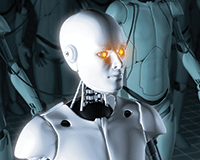This year’s London Business School Global Leadership Summit lifted the veil on the future and what we should expect in a world where artificial intelligence plays an increasing role.

It seems we will increasingly interact with robots, and yet for the most part remain blissfully ignorant. So how is this collaboration between humans and AI likely to take shape and what will it mean for us?
The panel of eminent futurists – Rohit Talwar, Gray Scott and Gerd Leonhard – offered insights into a rapidly changing world. Leonhard, founder of the Futures Agency, told the audience that we will see more change in the next 20 years than we have in the past three centuries.
It was claimed that in five years, 92% of call centres will be run by AI and in 10 to 20 years, 58% of financial advisers will be replaced. Already, we were told, the IBM Watson computer can churn out due diligence on corporate transactions in seconds, a task that would normally take lawyers months.
The construction industry is due for a massive transformation too. In China, hotels are already being constructed in 360 hours. As UK housing construction methods are criticised for being little changed since Victorian times, this could be good news, although it will affect jobs.
We will soon be dealing with our client’s “intelligent agent” rather than the client, says Leonhard. MIPIM could be a very different experience, with your avatar minding your stand in the Palais de Festivals as you cruise the Croisette.
However, Leonhard is keen to stress a need to retain a synthesis of people and tech. “You have to have the two,” he insists.
Leonhard is particularly interested in ensuring we preserve human characteristics and interactions alongside the machines. He believes humans are likely to become dependent on digital machines “simply because they are so easy to use, so powerful, so addictive”.
I asked him what we humans need to do to avoid total dependence. He pondered that it would be difficult to avoid because “our natural laziness” leads humans to make life easier for ourselves.
So what skills will we need to succeed in this brave new world?
Any work of a repetitive nature is likely to be replaced by AI. Leonhard used the example of property valuation, which he says will be replaced by computer software. He concedes that while an app can calculate value, it won’t know what the neighbours are like. This is where human perception, empathy and creativity will become more important.
Businesses will need to focus on what makes them unique as in five years’ time all professionals will be using the same technology and research software. Your choice of law firm or accountancy practice, therefore, will be based on how they analyse and present information.
Leonhard says the new careers will be for “humanisers”. They will be curators, acting as an interface between humans and machines, considering the factors the machine has not taken into account.
As AI becomes increasingly effective, the time we need to spend at work will shrink radically. Companies need to prepare for this now as they will have to lay off staff later. A clear message from the summit was that workers need to be reskilled and that schools and universities need to provide a different education to better equip students for the future.
According to Leonhard, only two types of jobs will be important – either in technology and science or jobs around HR, negotiation, therapy and marketing. These areas will remain important because, he says, it is almost impossible to replace them with machines.
What does Leonhard find most worrying about the pace of change? “Politicians are not really aware of the major technological changes affecting the landscape,” he says. Some governments, he says, just don’t understand the ramifications.
He cautions that technology needs supervision and regulation. It is a view shared by a group of concerned scientists, researchers and academics including Elon Musk and Stephen Hawking, who have warned against the consequences of using AI to control weapons.
As Leonhard puts it: “Technology can be hell or heaven.”
Gerd Leonhard
Switzerland- and San Francisco-based Gerd Leonhard is chief executive of the Futures Agency and a world-renowned thinker and speaker on near-future, “nowist” observations and actional foresights in the sectors of humanity, society, business, media, technology and communications. Click here to find out more about his views, and watch his web-based TV series TheFutureShow.
Are you working with technology or AI to create a better built environment? If so, why not put yourself forward for Estates Gazette’s Top 50 Collaborators, a special publication in association with Mishcon de Reya, JLL and CRS. E-mail samantha.mcclary@estatesgazette.com with a short paragraph about why you should be considered for the shortlist or interact with @estatesgazette on Twitter using #thecollaborators












